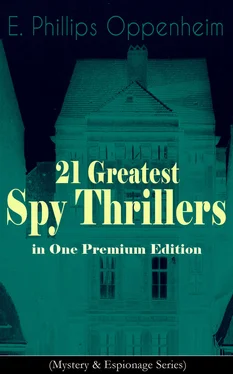“Did you ask her what was in the vans?” Charles asked.
“No, but I will.”
Fritz called back the woman and Charles descended from the taxi. She answered his questions through the railings.
“The vans were mostly locked up, sir,” she told him, “but one thing is very certain. The first Germans who came were very disappointed. There were many officers amongst them and one or two civilians. They walked up and down the quadrangle and argued. Sometimes they went back into the house as though for another search. Then a fresh lot came. It was always the same—they went away angry.”
Charles searched his pocket and dropped a few reichsmarks into the woman’s eagerly outstretched hand.
“I want you to try and remember something for me.”
There were tears in her eyes. Her clenched fingers were gripping the silver coins. She was shaking from head to foot.
“Tell me what it is, mein gnädiger Herr ,” she half sobbed.
“There is one person whom you must remember coming here often—Miss Patricia Grey, Mr. Benjamin’s secretary.”
“The little one?” she asked. “Always with a smile—with the hair— ach , so lovely?”
“That is she,” Charles acknowledged. “Tell me, have you seen anything of her lately? Can you tell me where to find her?”
The woman’s face fell. She shook her head drearily.
“The last time I saw her, mein Herr ,” she confided, “she was between two great Nazi soldiers or policemen—I do not know which—who were bringing her away from the house. She had passed through the gates only an hour before, waved her hand and thrown me a kiss. She was always so gay. When she went out her face was white and set, her hair was disarranged, it looked as though she had been struggling.”
“What do you suppose they were doing with her?”
“They were taking her to prison, mein Herr . That I know.”
“And you have never seen or heard of her since?”
“Not once.”
“She was a very important person in the household,” he persisted. “You have not heard anything from the other servants or seen anything in the papers about her?”
She shook her head.
“ Mein Herr will understand,” she recounted sorrowfully, “that I have lost my husband and two sons. My daughter has disappeared. There is no one left. The young lady, she passed out of my mind.”
“I am afraid that is quite natural,” he murmured sympathetically. “Well, the other person was a man—a rather thickset, short man. His name was Blute. He talked a great deal. He was very clever and he worked for Mr. Benjamin.”
“ Mein Herr , you have not the chance this morning,” she said. “Two days after the Nazis’ first visit here he was carried out on a stretcher. He had been in the house working in the library. The soldiers had been asking him many questions. There was a quarrel and a fight. They said that he was keeping something back and they took him away to be examined in the prison. Never once has he been back, neither have I heard of him. There were others who were servants of Mr. Benjamin and Dr. Schwarz, the President of his hospital. They have all disappeared.”
Charles wrote down his name and his address at the hotel.
“If you hear anything,” he begged, “will you let me know—especially about the Fräulein .”
The woman nodded.
“I will let you know,” she promised, “but all the people of that world have gone—gone—gone.”
She waved her hands downwards in despair. Charles stepped back into the taxicab.
“Fritz,” he said firmly, “I want to find that young lady.”
“One young lady,” Fritz sighed, “in all this city! It is so many months ago—”
“Look here,” Charles interrupted, “you are a sensible person. I shall try the police only as a last resource because, to tell you the truth, I do not think the police would help me. But think now—in what quarter of the city would they seek to live when they were set free from prison, if ever they were taken there? Remember, it must not be too far away. Herr Blute would stay in a hotel, I should think. The girl would try to find cheap lodgings. Drive me to the quarter where people in that condition of life would live. I will sit at the cafés, the cheap cafés. We will take it by turns, Fritz. You must eat six meals a day. We must go to all the restaurants. You must drink beer or coffee at all the cafés. A spirit of restlessness must drive you from place to place. We must find them, Fritz. Succeed, and I will take you to England into my own household, or, if you prefer it, I will establish you here.”
Life flowed back into the man’s veins. He had dined enormously the night before, he had drunk many beers, he had found a great patron. He was Viennese to the backbone. Joy took the place of sorrow. He threw his cap into the air and caught it.
“All day and all night I shall search!” he exclaimed. “They cannot escape me, those two!”
“Stop a moment,” Charles said. “There must be some method about our search. I am going to take it for granted that they will follow the example of nearly everyone in a city. They will sleep in their lodging, wherever it may be, and eat at a restaurant. Very well. Put me down far away from the fashionable places, in the district where clerks and middle-class people might go for their mittagessen . I will have an apéritif at one place, I will eat at another, I will drink coffee at another. You must commence with the places for the poorer people. You must do the same thing. Every three hours you must report to me—that is to say, we meet at Sachet’s Hotel at three o’clock, at six o’clock, at nine o’clock and at twelve. Is that understood?”
“Alas, mein Herr , it is by now midday,” Fritz declared, pointing to a church clock.
“Drive me then,” Charles ordered, “to the neighbourhood I spoke of and leave me. I will be back at Sacher’s Hotel at three o’clock. It may be that I shall give myself a rest then from this seeming to eat and drink continually. I shall leave you to carry on until six. Afterwards we will comb the city. That is understood?”
“It is understood, mein Herr ,” Fritz agreed enthusiastically.
He mounted to the driver’s seat.
“In a quarter-of-an-hour, mein Herr , you will have commenced your part of the search.”
At ten minutes to nine that evening Charles, with a crick in his neck, the sense of a new sort of fatigue in his eyes, limped into the American Bar at Sacher’s. A familiar figure was there talking eagerly to the barman. It was Fritz in his brand new suit and holding his chauffeur’s cap in his hand. Charles strode up to him.
“Well, Fritz?”
There was the light of triumph in Fritz’s bright eyes as he turned round.
“ Mein Herr “ he confided proudly, “the search is over. I triumph! It is an affair of ten minutes before I bring you to them.”
Charles swallowed a cocktail at a gulp. He had learnt during the afternoon and early evening every subterfuge possible of make-believe for getting rid of unwanted beverages. The cocktail tasted like nectar. He followed Fritz out of the place.
“Which of them is it?” he asked.
“Both,” Fritz replied. “Without a doubt, I should say both. The young lady I could swear to. The man—he was as you described him. Listen, mein Herr . I did not know,” he went on, tapping his forehead, “what was to be the end of this enterprise. I decided that I must have caution. I found, but I did not address them. I saw them take their places in an eating house. Oh, mein Herr , it is a poor place! I did not permit myself to be seen.”
Charles frowned.
Читать дальше












